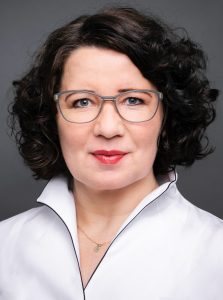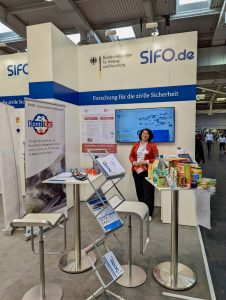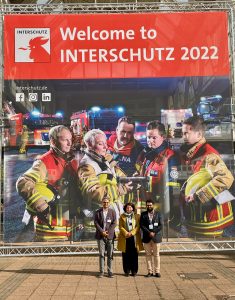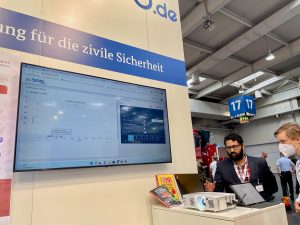Leitung der Nachwuchsforschergruppe
Soziologin

Kontakt:
E-Mail: maren.schorch(at)shb-sba.de
Vita
- Postdoc Projekt: Kontinuit, Krisen und Resilienz in Unternehmen und Gesellschaft mit dem Schwerpunkt (Not-)Bevorratung
- Lehrbeauftragte und Fachberaterin an der Steinbeis Hochschule, Vertiefung „Emergency Management“, seit 2020
- Postdoc am Lehrstuhl „Computer Supported Cooperative Work and Social Media“ (Prof. Dr. Volkmar Pipek), Universität Siegen, 01/2022 – 04/2022
- Leiterin der BMBF-Nachwuchsforschergruppe „KONTIKAT“, Universität Siegen, 11/2017-12/2021
- PostDoc in der BMBF-Nachwuchsforschergruppe „KONTIKAT“ (Zivilgesellschaftliche und betriebliche Kontinuität durch sozio-technische Vernetzung in Katastrophenlagen), Universität Siegen, seit 06/2017
- Wissenschaftliche Mitarbeiterin im BMBF Projekt „Cognitive Village – Das vernetzte Dorf“, 04/2017-10/2017 (Vertretung)
- Wissenschaftliche Mitarbeiterin im SFB 1187 „Medien der Kooperation“, Teilprojekt A05 „Kooperative Herstellung von Nutzerautonomie im Kontext der alternden Gesellschaft“, Universität Siegen, 08/2016-12/2017 (seit 01/2018 assoziiertes Mitglied)
- Leiterin und wissenschaftliche Mitarbeiterin des deutschen Teilprojektes im EU-Projekt „TOPIC – The Online Platform for Informal Caregivers“, Universität Siegen, 2013-2016
- Wissenschaftliche Mitarbeiterin, Lehrstuhl für Wirtschaftsinformatik und Neue Medien, Fakultät III, Universität Siegen, 2013-2017
- Wissenschaftliche Mitarbeiterin der Geschäftsführung am Zentrum für interdisziplinäre Forschung (ZiF), Universität Bielefeld, 2012-2013
- Koordinatorin und wissenschaftliche Mitarbeiterin der Forschungsgruppe „Communicating Disaster“, Zentrum für interdisziplinäre Forschung (ZiF), Universität Bielefeld, 2009-2012
- Lehrkraft für besondere Aufgaben, Arbeitsbereich Qualitative Methoden der empirischen Sozialforschung (Prof. Dr. Jörg Bergmann), Fakultät für Soziologie, Universität Bielefeld, 2008-2010
- Wissenschaftliche Mitarbeiterin, Lehrstuhl für Allgemeine Soziologie (Prof. Dr. Alois Hahn), Fachbereich IV, Universität Trier, 2002-2008
- Magisterstudium der Soziologie, Psychologie und Anglistik (Literaturwissenschaft) an der Friedrich-Schiller-Universität zu Jena und der Universität Trier
- Volunteer, Leonard Cheshire Disability, Cheltenham, Großbritannien
Forschungsinteressen
- Qualitative Katastrophenforschung
- Soziologie, Schwerpunkt Qualitative Methoden der Sozialwissenschaft
- Computer Supported Cooperative Work (CSCW)
- Umgang mit Gesundheit und Krankheit
Projekte
- BMBF Nachwuchsforschergruppe „KONTIKAT“ (Zivilgesellschaftliche und betriebliche Kontinuität durch sozio-technische Vernetzung in Katastrophenlagen): http://www.KONTIKAT.de, 2017-2021
- SFB 1187 „Medien der Kooperation“, Teilprojekt A05 „Kooperative Herstellung von Nutzerautonomie im Kontext der Alternden Gesellschaft“: https://www.mediacoop.uni-siegen.de/en/projects/a05/, 2016-2018 aktives Mitglied, seit 2018 assoziiertes Mitglied
- Soziologische Dissertation „Identity revisited. Selbstthematisierung und Positionierung in qualitativen Interviews. Fallanalysen von Personen mit transnationalen Biografien“, Universität Trier (Betreuer: Prof. Dr. Alois Hahn, Prof. Dr. Julia Reuter; Note: summa cum laude)
- Joint Program: EU und BMBF Projekt TOPIC – The Online Platform for Informal Caregivers, 2013-2016
- Forschungsgruppe „Communicating Disaster“, Zentrum für interdisziplinäre Forschung (ZiF), Universität Bielefeld, Leitung: Prof. Dr. Jörg Bergmann, Prof. Dr. Heike Egner, Prof. Dr. Volker Wulf, 2009-2012
- „Arrangierte Ehen. Untersuchung zum Heiratsverhalten von Muslimen in Deutschland“ . Arbeitskreis Migration und Segregation Trier (qualitative Studie), 2006-2010
- Lehrforschungsprojekt „Transnationalität: Chance oder/und Krise?“, Universität Trier (qualitative Studie), 2007-2008
- Lehrforschungsprojekt „Sozialkapital und Berufseinstieg von Akademikern“, Universität Trier (qualitative und quantitative Studie; in Kooperation mit Karoline Krenn), 2004-2005
- Projekt „Jugend im Stadt-Land-Vergleich“, Universität Trier (Leitung: Waldemar Vogelgesang), 1999-2000
Forschungsfokus
Welche Vorstellungen von Kontinuität und (sozio-technischem, ökonomischen etc.) Wandel lassen sich in alltäglichen Praktiken in kleinen und mittelständischen Unternehmen, aber auch allgemein in der Siegener Bevölkerung beobachten und beschreiben? Und wie beeinflussen diese die jeweilige Wahrnehmung von Krisen, die eigene Resilienz und ggf. eine entsprechende Vorbereitung (Notbevorratung, Aufbau von entsprechenden Netzwerken, Information usw.)? Konzentrierten sich Arbeiten zur Notbevorratung bislang primär auf Richtlinien und Handlungsempfehlungen von BOS (Behörden und Organisationen mit Sicherheitsaufgaben), die top-down an Zivilbevölkerung und kleine und mittelständische Unternehmen (KMU) zur Umsetzung weitergegeben wurden, stellt dieses Forschungsvorhaben von Dr. Marén Schorch hingegen die Perspektive der Zivilbevölkerung und der Akteure von KMU in den Mittelpunkt.
Aktuelle Veranstaltung und Vortrag:
1) Unsere Bewerbung war erfolgreich: KontiKat wurde ausgewählt, auf der INTERSCHUTZ 2022 gemeinsam mit dem BMBF einige unserer Arbeiten auszustellen (20. bis 25. Juni 2022 in Hannover). Es war großartig!
Vielen Dank für die Unterstützung während der Messewoche an meine Kollegen
Hussain A. Syed, Syed Muhammad Raza, Sebastian Zilles und Nino Bohn.
Informationen zur INTERSCHUTZ 2022: https://www.interschutz.de/de/
(85.000 Besucher aus 61 Ländern)
2) Außerdem habe ich im Rahmen des Konferenzprogramms der INTERSCHUTZ 2022 am 21. Juni 2022 noch einen Vortrag zum Thema „Better safe than sorry. Emergency preparedness for business and society“ gehalten.




Publikationen
- Marén Schorch (2022): Abschlussbericht der BMBF Nachwuchsforschergruppe KontiKat 2017-2021. In: OPAC. Siegen: Universitätsbibliothek Siegen. http://dx.doi.org/10.25819/ubsi/10209
- Hussain A. Syed, Marén Schorch, Aparecido Fabiano de Carvalho, Philipp Rutz and Volkmar Pipek (2022): Blending Practices to Facilitate Grounded Design Research: A Praxeological Research Perspective, in: Proceedings of the 20th European Conference on Computer-Supported Cooperative Work: The International Venue on Practice-centred Computing on the Design of Cooperation Technologies – Notes, Reports of the European Society for Socially Embedded Technologies (ISSN 2510-2591), DOI: 10.48340/ecscw2022_n04
- Heike Egner, Marén Schorch (2022): Gesellschaftliches Lernen im Kontext von Extrem-ereignissen, in: Carsten Felgentreff, Thomas Glade (Hrsg.) (2022): Naturrisiken und Sozialkatastrophen, 2. Auflage, Berlin, Heidelberg: Springer (im Druck).
- Hussain A. Syed and Marén Schorch (eds.) (2021): Infrastructuring for organizational resilience: A workshop report. in: International Reports on Socio-Informatics (IRSI) 18 (1).
- Hussain A. Syed and Marén Schorch (2021): Editorial to “Infrastructuring for organizational resilience: A workshop report”. in: International Reports on Socio-Informatics (IRSI) 18 (1), pp. 4-14.
- Hussain A. Syed, Marén Schorch, Sam A. Ankenbauer, Sohaib S. Hassan, Konrad Meisner, Martin Stein, Sascha Skudelny, Helena Karasti, Volkmar Pipek (2021): Infrastructuring for organizational resilience: Experiences and perspectives for business continuity. In: Proceedings of the 19th European Conference on Computer-Supported Cooperative Work: The International Venue on Practice-centred Computing on the Design of Cooperation Technologies – Workshops, EUSSET (ISSN 2510-2591), link, doi:10.18420/ecscw2021-wsmc02
- Marén Schorch, Fabienne Seifert, Hussain Abid Syed, Christoph Kotthaus, Volkmar Pipek (2020): Doing CSCW Research in Small and Medium Enterprises: Experiences, Options and Challenges, Proceedings of the 18th European Conference on Computer-Supported Cooperative Work: Workshop Papers, Reports of the European Society for Socially Embedded Technologies (ISSN 2510-2591). link , doi:10.18420/ecscw2020_ws02
- Marén Schorch, Fabienne Seifert, Amanda Langer, Margarita Grinko, Thea Riebe, Sascha Skudelny, Hussain A. Syed, Sohaib S. Hassan (2020): Corona Pandemic. Position Paper KontiKat. OPUS. Siegen: University Library Siegen. doi.org/10.25819/ubsi/10076 Corona_position_paper_KONTIKAT_2020
- Hussain A. Syed, Marén Schorch, Volkmar Pipek (2020): Disaster Learning Aid: A chatbot-centric approach for improved organizational disaster resilience, In: WiP Paper – Enhancing Resilient Response in Inter-Organizational Contexts: Learning from Experience. Proceedings of the 17th ISCRAM Conference – Blacksburg, VA, USA May 2020, pp. 448-457. Syed_Schorch_Pipek_2020_DisasterAid_ISCRAM2020
- Qinyu Li, Peter Tolmie, Anne Weibert, Marén Schorch, Claudia Müller, Volker Wulf (2020):
E-Portfolio: value tensions encountered in documenting design case studies, in: Ethics and Information Technology 23, pp. 89-93. Springer. link, doi:10.1007/s10676-020-09533-3 - Marén Schorch (2022): Identity revisited. Selbstthematisierung und Positionierung in qualitativen Interviews. Fallanalysen von Personen mit transnationalen Biografien, Reihe: „Interkulturelle Studien“, Wiesbaden: Springer VS Verlag für Sozialwissenschaften. (im Druck).
- Sebastian Tauterbeck, Michael Ahmadi, Marén Schorch, David Unbehaun, Konstantin Aal, Volker Wulf (2019): Digital Participation in Prison – A Public Discourse Analysis of the Use of ICT by Inmates. Proceedings of the ACM Conference in Human-Computer Interation. Vol. 3, GROUP, Article No. 233, pp. 1-26. https://doi.org/10.1145/3361114.
- Marc-André Kaufhold, Margarita Grinko, Christian Reuter, Marén Schorch, Amanda Langer, Sascha Skudelny, Matthias Hollick (2019): Potentiale von IKT beim Ausfall kritischer Infrastrukturen: Erwartungen, Informationsgewinnung und Mediennutzung der Zivilbevölkerung in Deutschland, Proceedings of the WI 2019: Internationale Konferenz für Wirtschaftsinformatik, Siegen, S. 1054-1068. 2019_KaufholdGrinkoReuteretal_KritischeInfrastrukturenErwartungen_WI
- Konstantin Aal, Marén Schorch, Esma Ben, Hadj Elkilani, Volker Wulf (2018): Facebook and the Mass Media in Tunisia, In: Media in Action. Interdisciplinary Journal on Cooperative Media. Issue 3/ 2018, pp. 137-170. url
- Susanne Hensely-Schinkinger, Marén Schorch, Hilda Tellioglu (2018): Using cultural probes in the sensitive research setting of informal caregiving. A case study, In: i-com – Journal of Interactive Media 17(2), pp. 103-117. doi:10.1515/icom-2018-0010
- Christian Reuter, Marc-André Kaufhold, Marén Schorch, Jan Gerwinski, Christian Soost, Sohaib S. Hassan, Gebhard Rusch, Petra Moog, Volkmar Pipek, Volker Wulf (2017): Digitalisierung und zivile Sicherheit: Zivilgesellschaftliche und betriebliche Kontinuität in Katastrophenlagen (KontiKat), in: Gero Hoch, Hildegard Schröteler-von Brandt, Angela Schwarz, & Volker Stein (Hrsg.): Sicherheit (DIAGONAL Jahrgang 38). Göttingen: Vandenhoeck & Ruprecht 2017, S. 207-224. Link
- Matthias Korn, Volkmar Pipek, Marén Schorch, Matthew Bietz, Carsten Østerlund, Rob Procter, David Ribes, Robin Williams (2017): E-Infrastructures for Research Collaboration: The Case of the Social Sciences and Humanities., CSCW 2017 – Companion of the 2017 ACM Conference on Computer Supported Cooperative Work and Social Computing, pp. 415-420. doi:10.1145/3022198.3022655
- Marén Schorch, Claudia Müller, Johanna Meurer (2017): Cultural Probes: The best way to go for PD in sensitive research settings? A methodological reflexion, in: Manuel Burghardt, Raphael Wimmer, Christian Wolff, Christa Womser-Hacker (Hrsg.): Mensch und Computer 2017, Workshopband, S. 73-78, Regensburg: Gesellschaft für Informatik e.V., doi:10.18420/muc2017-ws02-0304
- Claudia Müller, Marén Schorch, David Struzek, Marleen Neumann (2017): Technology Probes als Mittel zur Unterstützung der Technik-Aneignung, In: Manuel Burghardt, Raphael Wimmer, Christian Wolff, Christa Womser-Hacker (Hrsg.): Mensch und Computer 2017, Workshopband, S. 87-93, Regensburg: Gesellschaft für Informatik e.V., doi:10.18420/muc2017-ws02-0318
- David Struzek, Marleen Neumann, Claudia Müller, Marén Schorch, Dominik Hornung (2017): Aneignungshilfen für Senioren-Projektpartner – am Beispiel Google Drive, in: Manuel Burghardt, Raphael Wimmer, Christian Wolff, Christa Womser-Hacker (Hrsg.): Mensch und Computer 2017, Workshopband, S. 249-253, Regensburg: Gesellschaft für Informatik e.V., doi:10.18420/muc2017-mci-0349
- Stickel Oliver, Konstantin Aal, Marén Schorch, Dominik Hornung, Alexander Boden, Volker Wulf, Volkmar Pipek (2017): Computerclubs und Flüchtlingslager. Ein Diskussionsbeitrag zur Forschungs- und Bildungsarbeit aus praxistheoretischer Perspektive, in: Nikola Langreiter, Klara Löffler (Hrsg.): Selber machen. Diskurse und Praktiken des „Do it yourself“, S. 149-169, Bielefeld: transcript Verlag. doi:10.14361/9783839433508
- Marén Schorch, Lin Wan, David Randall, Volker Wulf (2016): Designing for Those who are Overlooked. Insider Perspectives on Care Practices and Cooperative Work of Elderly Informal Caregivers, In: Proceedings of the 19th ACM Conference on Computer-Supported Cooperative Work & Social Computing – CSCW ’16, San Francisco, USA, pp. 785-797, doi:10.1145/2818048.2819999
- Katja Neureiter, Claudia Müller, Markus Garschall, Marén Schorch, Lex van Velsen, Dominik Hornung (2016): Challenges and experiences in designing for an ageing society. Reflecting on concepts of age(ing) and communicating practices, In: Proceedings of the COOP 2016 – Symposium on challenges and experiences in designing for an ageing society, International Reports on Socio-Informatics 13(3), S. 5-20, Bonn: IISI – International Institute for Socio-Informatics, pdf
- Foad Hamidi, Claudia Müller, Melanie Baljko, Marén Schorch, Myriam Lewkowicz, Abigale Stangl (2016): Engaging with Users and Stakeholders: The Emotional and the Personal, in: GROUP ‘16 Proceedings of the 19th International Conference on Supporting Group Work 2016, New York, NY, USA, pp. 453-456. doi:10.1145/2957276.2996292
- Katja Neureiter, Claudia Müller, Markus Garschall, Marén Schorch, Lex van Velsen, Dominik Hornung (2016): Challenges and experiences in designing for an ageing society. Reflecting on concepts of age(ing) and communicating practices, in: Proceedings of the COOP 2016 – Symposium on challenges and experiences in designing for an ageing society, International Reports on Socio-Informatics volume 13 (issue 3) 2016, Bonn: IISI – International Institute for Socio-Informatics 2016, pp. 5-20. pdf
- Heike Egner, Marén Schorch, Martin Voss (2015): Learning and Calamities: Practices, Interpretations, Patterns, New York/London: Routledge. Link, doi:10.4324/9780203794678
- Heike Egner, Marén Schorch, Martin Voss (2015): Introduction: Can Societies Learn From Calamities?, in: Heike Egner, Marén Schorch and Martin Voss (eds.): Learning and Calamities. Practices, Interpretations, Patterns. New York/London: Routledge 2015, pp. 1-23. doi:10.4324/9780203794678
- Heike Egner and Marén Schorch (2015): Learning and Calamities – What Have We Learned? Steps Towards an Integrative Framework. In: Heike Egner, Marén Schorch and Martin Voss (eds.): Learning and Calamities. Practices, Interpretations, Patterns. New York/London: Routledge 2015, pp. 291-302. doi:10.4324/9780203794678
- Hilda Tellioglu, Myriam Lewkowicz, Aparecido Fabiano, Pinatti De Carvalho, Ivan Breškovic, Marén Schorch (2014): Collaboration and coordination in the context of informal care (CCCiC 2014), in: Proceedings of the ACM Conference on Computer Supported Cooperative Work (CSCW), pp. 339-342. doi:10.1145/2556420.2558862
- Claudia Müller, Marén Schorch und Rainer Wieching (2014): PraxLabs as a Setting for Participatory Technology Research and Design in the Field of HRI and Demography. In: Workshop Position Paper, Workshop „Socially Assistive Robots for the Aging Population: Are we trapped in Stereotypes?“, Human Robot Interaction Conference 2014, CITEC, Bielefeld Universität/University. Mueller_Schorch_Wieching_PositionPaper_HRI14_Workshop_2014
- Volker Wulf und Marén Schorch (2013): Digitale Medien: Neue Wege politischer Partizipation? Web 2.0 und Social Media in der Tunesischen Revolution. Ein Bericht aus Sidi Bouzid, In: Ulrike Davy und Manuela Lenzen (Hrsg.): Demokratie morgen. Überlegungen aus Wissenschaft und Politik. Bielefeld: transcript Verlag 2013, S. 71-91. doi:10.14361/transcript.9783839423875.71
- Andrea Hense and Marén Schorch (2013): Arranged Marriages as Support for Intra-ethnic Matchmaking? A Case Study on Muslim Migrants in Germany, In: International Migration 51(2), pp. 104-126. doi:10.1111/j.1468-2435.2010.00631.x
- Heike Egner, Marén Schorch, Sarah Hitzler, Jörg Bergmann, Volker Wulf (2012): Communicating Disaster. A Case for Qualitative Approaches to Disaster Research. Report of a Research Group at the Center for Interdisciplinary Research (ZiF), Bielefeld University, in: Zeitschrift_für_Soziologie_2012_Communicating_Disaster_A_Case_for_Qualitative_Approach
- Marén Schorch, Heike Egner, Dieter Neubert (2012): Learning from Calamities? Reflexions and Evaluations of the Outcomes of our Research Year, in: ZiF Mitteilungen 1/2012,
pp. 14-17. ZiF_Mitteilungen_2012-1_Reflections - Sarah Hitzler and Marén Schorch (2012): Dealing with the Disasters of Others. Closing Conference of the ZiF Research Group “Communicating Disaster”, in: ZiF Mitteilungen 2/2012, pp. 33-37. ZiF_Mitteilungen_2012_2_Dealing_with_the_disaster_of_others
- Sarah Hitzler, Marén Schorch, Heike Egner, Jörg Bergmann, Volker Wulf (2012): Communicating Disaster – Six maxims for a new take on disaster research, in: ZiF Mitteilungen 3/2012, pp. 4-10. ZiF_Mitteilungen_2012_3_Six_Maxims
- Jörg Bergmann, Sarah Hitzler, Marén Schorch (2011): Tagungsbericht: ZiF- Forschungsgruppe „Communicating Disaster“: Inauguration Conference, in: Zeitschrift für Soziologie 40(2),
S. 165-168. Zeitschrift_für_Soziologie_40_Communicating_Disaster_Intro - Marén Schorch und Sarah Hitzler (2011): Communicating Disaster: Kick-off-Tagung, in: ZiF Mitteilungen 1/2011, S. 14-15.
- Marén Schorch und Sarah Hitzler (2011) Communicating Disaster: Eröffnungstagung, in: ZiF Mitteilungen 2/2011, S. 43-46.
- Marén Schorch und Gebhard Rusch (2011): Medien in der Katastrophe – Katastrophe in den Medien. Bericht eines Workshops, in: ZiF Mitteilungen 3/2011, S. 70-72.
- Marén Schorch (2011): Communicating Disaster: Workshop Reports, in: ZiF Mitteilungen 3/2011, S. 11-12.
- Marén Schorch (2011): Narrative Verdichtungen transnationaler Biographien in qualitativen Interviews, in: Teresa Tschech (Hrsg.): Nationale und europäische Identität im Spannungsfeld weltgesellschaftlicher Orientierung, Vorträge zum Doktorandenkolloquium vom 12.-17. September 2010 in der Villa Vigoni, S. 71-84. M_Schorch_Narrative_Verdichtungen
- Marén Schorch und Sarah Hitzler (2010): Communicating Disaster: Vorstellung der Forschungsgruppe, in: ZiF Mitteilungen 3/2010, S. 6-9.
- Marén Schorch (2009): Rituelle und symbolische Inszenierung von Zugehörigkeit. Das sorbische Osterreiten in der Oberlausitz, in: Herbert Willems (Hrsg.): Theatralisierung der Gesellschaft. Band 1: Soziologische Theorie und Zeitdiagnose. Wiesbaden: VS Verlag für Sozialwissenschaften 2009, S. 331-354. doi:10.1007/978-3-531-91442-8_14
- Marén Schorch (2009): Diskussionsbericht: Semantiken – Diskurse – Konzepte, in: Peter Strohschneider (Hrsg.): Literarische und religiöse Kommunikation in Mittelalter und Früher Neuzeit. Germanistisches DFG-Symposion 2006, Berlin: de Gruyter S. 272-281.
- Alois Hahn and Marén Schorch (2007): Technologies of the Will and their Christian Roots, in: Sabine Maasen, Barbara Sutter (eds.): On Willing Selves. Neoliberal Politics and the Challenge of Neuroscience. London: Palgrave Macmillan 2007, pp. 53-76. doi:10.1057/9780230592087
- Alois Hahn und Marén Schorch (2007): Tests und andere Identifikationsverfahren als Exklusionsfaktoren, in: Antje Gunsenheimer (Hrsg.): Grenzen, Differenzen, Übergänge: Spannungsfelder inter- und transkultureller Kommunikation. VolkswagenStiftung. Bielefeld: transcript Verlag 2007, S. 253-268. PDF doi:10.14361/9783839407943-017
- Waldemar Vogelgesang, Iris Eisenbürger, Alexander Haubrichs, Marén Schorch (2001): Meine Zukunft bin ich! Alltag und Lebensplanung Jugendlicher, Frankfurt/Main: Campus Verlag.
Organisation von Workshops und Konferenzen
- Workshop „Infrastructuring for organizational resilience: Experiences and perspectives for business continuity“ (mit Hussain A. Syed, Sam A. Ankenbauer, Sohaib S. Hassan, Konrad Meisner, Martin Stein, Sascha Skudelny, Helena Karasti und Volkmar Pipek), ECSCW 2021 (European Conference on Computer Supported Cooperative Work), Juni 2021, Universität Zürich, virtuelle Konferenz
- Track „Exploratory Papers” (mit Ingrid M. Erickson, Syracuse University, U.S.) der ECSCW 2020 (European Conference on Computer Supported Cooperative Work), 15.-17. Juni 2020, Universität Siegen
- Workshop „Doing CSCW Research in Small and Medium Enterprises. Experiences, Options and Challenges“ (mit Fabienne Seifert, Hussain A. Syed, Christoph Kotthaus und Volkmar Pipek), ECSCW 2020 (European Conference on Computer Supported Cooperative Work), 13. Juni 2020, Universität Siegen, virtuell
- Track 9: „Krisen- und Kontinuitätsmanagement“ (mit Stefan Stieglitz und Christian Reuter), WI 2019: Konferenz für Wirtschaftsinformatik, Siegen, Februar 2019
- Workshop Series “Ethnography in Co-operation” (Organisation mit Mathias Decuypere, Samira Ali Reza Beigi und Inka Fürtig), Universität Siegen und Katholieke Universiteit Leuven, Belgiu, seit 2019
- Workshop Digital Platforms – Boundary Infrastructures, SFB 1187 Medien der Kooperation (mit Sebastian Gießmann, Carolin Gerlitz, Hendrik Bender, Claudia Müller, Sigrid Baringhorst, Mundo Yang, Dagmar Hoffmann und Wolfgang Reißmann), 2.-3. November 2017, Universität Siegen
- Workshops Doing interdisciplinary research (Gestaltungslabor), zweiwöchentliche Veranstaltung im SFB 1187 Medien der Kooperation (mit Matthias Korn, Gaia Mosconi und Claudia Müller), Universität Siegen, 08/2016-02/2018
- ACM CSCW Workshop E-Infrastructures for Research Collaboration: The Case of the Social Sciences and Humanities (mit Matthias Korn, Volkmar Pipek, Matthew Bietz, Carsten Østerlund, Rob Procter, David Ribes und Robin Williams). Conference on Computer Supported Cooperative Work, February 2017, Portland, USA
- ACM GROUP Workshop Engaging with Users and Stakeholders: The Emotional and the Personal (mit Foad Hamidi, Claudia Müller, Melanie Baljko, Myriam Lewkowicz und Abigale Stangl). Konferenz GROUP ’16, November 2016, Sanibel Island, FL, USA
- Symposion Challenges and experiences in designing for an ageing society. Reflecting on concepts of age(ing) and communication practices (mit Lex van Velsen, Markus Garschall, Katja Neureiter, Claudia Müller und Dominik Hornung). Konferenz COOP 2016, Mai 2016, Trento
- Reguläre Workshops im Kontext des EU-BMBF/Projektes TOPIC, 2014-2016
- ACM CSCW-Workshop Collaboration and Coordination in the Context of Informal Care (mit Hilda Tellioğlu, Myriam Lewkowicz, Fabiano Pinatti de Carvalho und Ivan Brešković), Baltimore, USA, Februar 2014
- Konferenz Dealing with the Disasters of Others, Abschlusstagung der Forschungsgruppe Communicating Disaster, 26.-27. Januar 2012, Zentrum für interdisziplinäre Forschung (ZiF), Bielefeld
- Workshop Collective Intelligence and Crisis (Leitung mit Monika Büscher), European Conference on Computer-Supported Cooperative Work, 24. September 2011, Arhus University
- Workshop Learning from Calamities? Reflexions and evaluations of the outcomes of our research year (Leitung mit Heike Egner), 28.-29.Juli 2011, Zentrum für interdisziplinäre Forschung (ZiF), Bielefeld
- Workshop Learning from Calamities. Interpretative Patterns and Practices of Communication on Disasters (Leitung mit Heike Egner und Martin Voss), 25. Januar 2012, Zentrum für interdisziplinäre Forschung, Bielefeld
- Workshop New Social Media (Leitung mit Monika Büscher), 27. April 2011, Zentrum für interdisziplinäre Forschung (ZiF), Bielefeld
- Konferenz Communicating Disaster: Inauguration Conference,-15. Januar 2011, Zentrum für interdisziplinäre Forschung (ZiF), Bielefeld
- Workshop Communicating Disaster: Kick-Off, November 2011, Bielefeld
- Regelmäßiges Kolloquium Die Soziologie im interdisziplinären Dialog, Leitung: Dr. Alois Hahn, Universität Trier, 2002-2008
Vorträge auf Konferenzen
- “Crisis Preparedness, Cooperation, and Resilience against the Backdrop of Digitalisation”, Research Network „Disaster, Conflicts, and Social Crisis“, ESA 2021 (Conference der European Sociological Association), Barcelona, ES, August 2021
- „Prävention durch betriebliches Kontinuitätsmanagement (BCM) in KMU und individuelle (Not-)Bevorratung in der Zivilgesellschaft“, Neue Ansätze der Prävention: Zivile Sicherheitsforschung, Deutscher Präventionstag 2021, virtuelle Veranstaltung
- „Turning a Blind Eye to Risk and Resilience: Images of Crisis, Transformation and Emergency Preparedness“ (mit Fabienne Seifert) in der Session „Risk, Governance and Emergency Preparedness“, Research Networks 22 – Sociology of Risk and Uncertainty auf der ESA 2019 (Conference der European Sociological Association), Manchester, UK, 2019
- „Informal Caregivers and the Impacts of Images of Aging. Insights and Reflections from a Qualitative Study“, Session „Formal and informal care: Consequences of care giving and receiving“, Research Network 01 Ageing in Europe auf der ESA 2019 (Conference der European Sociological Association), Manchester, UK, 2019
- „Resiliente Bürger – resiliente Stadt. Notbevorratung als Aspekt der Selbstvorsorge im Krisenfall“, Ringvorlesung „Resiliente Stadt“, Hochschule für angewandte Wissenschaften Hamburg, 2019
- Keynote „User Participation in practice-based IT design“, Conference „Emotional Impacts on Cognitive Systems“, FOKOS: ForschungsKolleg Siegen, 2018
- „Selbstthematisierung und Positionierung von Personen mit transnationalen Biographien in qualitativen Interviews“, DGS Kongress 2018, Sektion Biographieforschung, Göttingen, 2018
- “There is no such thing as the elderly’. Results and reflection of three co-design research projects with elderly participants from a socio-technical point of view.“, XIX ISA World Congress of Sociology 2018, Toronto, RC11 Sociology of Aging, Toronto, 2018
- „‚Exactly what they need?’. Ethnography in informal care settings“, XIX ISA World Congress of Sociology 2018, RC33 Logic and Methodology in Sociology, Toronto, 2018
- „Sozio-technische Vernetzung in Katastrophenlagen“ (mit Marc-André Kaufhold), BMBF Innovationsforum 2018: „Zivile Sicherheit: analog und digital“, Berlin, 2018
- „Gestaltung des Designraums an Grenzen zwischen Privatheit und Öffentlichkeit mit Hilfe der Cultural Probes-Methode“, SFB 1187 Ringvorlesung „Kooperation an den Grenzen von Privatheit und Öffentlichkeit“, Universität Siegen, 2018
- „Negotiation and Presentation of Bodily Perception and Performance in the Design of Supportive Technologies for Older Adults“ (mit Claudia Müller), SFB 1187 Jahreskonferenz „Varieties of Cooperation. Mutually Making the Conditions of Mutual Making“, Universität Siegen, 2017
- „Cultural Probes: The best way to go for PD in sensitive research settings? A methodological reflexion“, Mensch und Computer 2017, Universität Regensburg, 2017
- „Kooperation im Kontext von informeller Pflege“, Ringvorlesung des SFB 1187 „Medien der Kooperation“, Universität Siegen, 2017
- „IT für die alternde Gesellschaft. Neue Technologien und Nutzungspraktiken zur Förderung der Lebensqualität und sozialen Teilhabe“, Universität Bremen, 2016
- „Designing for Those who are Overlooked. Insider Perspectives on Care Practices and Cooperative Work of Elderly Informal Caregivers“. 19th ACM Conference on Computer-Supported Cooperative Work & Social Computing (CSCW), San Francisco, 2016
- Plenarvortrag „Can societies learn from disasters and catastrophes?“, Conference „From Opportunity to Action: Bridging the Gap between Disaster Reduction and Development through Science(s), Technology and People Centred Actions“, DwD 2013 together with the 4th Conference of the IDRiM Society 2013, Northumbria University, Newcastle, 2013
- „Introductory Talk: Communicating Disaster: Framing a New Research Program“ (mit Heike Egner), Conference „Dealing with the Disasters of Others“, Closing conference of the research group „Communicating Disaster“, Zentrum für interdisziplinäre Forschung (ZiF), Bielefeld, 2012
- „‚Aus Schaden wird man klug – oder nicht?‘: Learning and Calamities. Ein interdisziplinäres Buchprojekt, 12. Forum Katastrophenvorsorge. Risiko Lernen – Lehren – Leben, Deutsches Komitee Katastrophenvorsorge e.V., Bonn, 2012
- „Expectations and Linguistic Excessively Demands in Transnational Families“, Sociolinguistic Symposium 18: Negotiating Transnational Space and Multilingual Encounters, University of Southampton, 2010
- „Narrative Verdichtungen transnationaler Biographien in qualitativen Interviews“, Europäisches Interdisziplinäres Doktorandenkolloquium „Nationale und europäische Identität im Spannungsfeld weltgesellschaftlicher Orientierung“, Deutsch-Italienisches Zentrum Villa Vigoni, Loveno di Mennagio, 2010
- „Qualitative Interviews als Biographiegeneratoren“, BGHS-Workshop „Semantiken der (Selbst-) Konstruktion. (Auto-)Biographisches Arbeiten in Soziologie und Geschichtswissenschaft im 19. und 20. Jahrhundert“, Universität Bielefeld, 2010
- „Are Highly Educated Fathers Protected Against Compatibility Problems? Work-Life-Balance of Professors in Germany“ (mit Julia Reuter), International Symposium „Fertility and Social Stratification. Germany and Japan in Comparison“, Deutsches Institut für Japanstudien (DIJ) Tokyo, 2008
- „Arranged Marriages in Germany. Inside Perspectives of Muslim Marriage Traditions“, Workshop „Transnationalism, Family Ties, and Migration in Europe“, EAPS Working Group „The Anthropological Demography of Europe“, INED Paris, 2007
- „Exklusionsgeneratoren. Enthüllung durch Geständnis, Kontrollbeobachtungen und Testverfahren“ (mit Alois Hahn), SFB 485 „Norm und Symbol“, Universität Konstanz, 2007
- „Self-Description and Ambivalence of Transnational Identities“, Summer School of the Postgraduate Program „Critical Junctures of Globalization“, Graduate Centre Humanities and Social Sciences der University of Leipzig, Centre for Advanced Studies, Universität Leipzig, 2006
- „Der Einbürgerungsfragebogen als gatekeeper?‘, Interdisziplinäre Podiumsdiskussion: „Der Einbürgerungsfragebogen – Medium der Integration oder Instrument der Diskriminierung?“, Universität Trier, 2006
- „Tests und andere Identifikationsverfahren als Exklusionsfaktoren“ (mit Alois Hahn), Tagung der VolkswagenStiftung „Grenzen. Differenzen. Übergänge: Spannungsfelder inter- und transkultureller Kommunikation“, Dresden, 2006
- „Mechanismen der Konstruktion von Identität“, Europäisches Internationales Doktorandenseminar „Identitäten in Europa – Europäische Identität“, Deutsch-Italienisches Zentrum Villa Vigoni, Loveno di Mennagio, 2004
Lehre (Auswahl)
Steinbeis Hochschule Berlin: Emergeny Management (seit 2020)
European Conference on Computer Supported Cooperative Work (ECSCW) 2022, Universität Coimbra, Portugal:
- Masterclass „Qualitative Methods in CSCW“
- Masterclass „CSCW Research in Small and Medium Enterprises“
European Conference on Computer Supported Cooperative Work (ECSCW) 2019, Universität Salzburg, Österreich:
- Masterclass „Qualitative Methods in CSCW“
- Masterclass „CSCW Research in Small and Medium Enterprises“
Universität Siegen (2013-2020):
- Continuity and (IT-)Security in the Context of Digitalisation (Master)
- Crisis research against the backdrop of digitalisation (Master)
- Individuelle und organisationale Konzepte von Kontinuität, (IT-)Sicherheit und Notbevorratung (Master)
- Krisenmanagement und Kriseninformationssysteme (mit Christian Reuter und Volkmar Pipek) (Master)
- Soziale und literarische Kommunikation von Katastrophen (mit Matthias Schaffrick) (Bachelor)
- Qualitative Datenanalyse in CSCW und HCI (Master, PhD)
Universität Bielefeld (2008-2010):
- Gegensätze ziehen sich an?! Qualitative Interviews zu Paaren und Gegensätzen (Bachelor)
- Qualitative Interviewpraktiken (Master, Diplom)
- Methodenwerkstatt qualitative Methoden (Bachelor)
- Identity revisited? – Qualitative Analyse von (auto-)biografischem Material (Master, Diplom)
- Grundbegriffe der Soziologie (Bachelor)
- Filmanalyse (Master)
- „Du bist jederzeit willkommen!“ Qualitative Methoden zur Exploration von Gastfreundschaft (Master, Diplom)
- Das Interview als Methode der qualitativen Sozialforschung (Master, Diplom)
- Qualitative Methoden in der Migrationsforschung (Master, Diplom)
Universität Trier (2002-2008):
- Ritual und Symbol. Inszenierung nationaler Identität (Bachelor)
- Transnationalität: Chance oder/und Krise? (Praxisbezogene Studienform)
- Klassiker der Soziologie: Norbert Elias und Michel Foucault (Proseminar)
- Das Eigene und das Fremde in der Soziologie (Proseminar)
- Identitäts- und Interkulturalitätstheorien (Proseminar)
- Max Webers Beiträge zur Sozial- und Wirtschaftsgeschichte (Proseminar)
- Ausgrenzungsprozesse (mit Alois Hahn) (Hauptseminar)
- Geheimnis und Geheimhaltung (mit Alois Hahn) (Proseminar)
- Minderheiten (Proseminar)
- Sozialkapital und Berufseinstieg von Akademikern (mit Karoline Krenn) (Praxisbezogene Studienform)
- Sociology of Health (Teaching Staff Mobility, University of Galway, Ireland)
- Konzepte (trans-)nationaler Zugehörigkeit (Proseminar)
- Die Soziologie Theodor W. Adornos (mit Alois Hahn) (Hauptseminar)
- Klassiker der Soziologie: Max Weber Proseminar (Proseminar)
- Klassiker der Soziologie: Georg Simmel (mit Alois Hahn) (Proseminar)
- Norbert Elias’ Zivilisationstheorie (Proseminar)
- Einstellungen zum Tod und ihre soziale Bedingtheit (mit Alois Hahn) (Hauptseminar)
- Identitätstheorien (Proseminar)